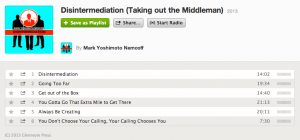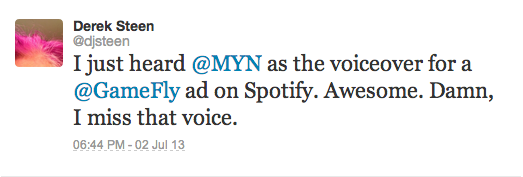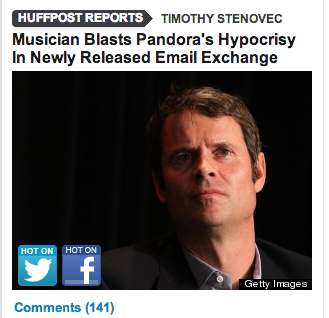Mark Yoshimoto Nemcoff's Blog, page 5
October 15, 2013
Disintermediation – Listen and Download on Spotify, iTunes, Amazon and More!
DISINTERMEDIATION (Taking Out the Middleman) is the latest MYN spoken-word audio release and it’s available on iTunes, Amazon and other services (and coming to dozens of more sites around the globe soon). Plus, you can listen now for free on Spotify.
This is the first spoken-word “album” I’ve released into the wild and, as opposed to podcasting, I’m thinking about doing more of this kind of thing with audio content in the not-too-distant future.









September 11, 2013
Tearing Down The Wall #1 Amazon Best Seller in the UK
 Pink Floyd is so iconic and popular to this day that it has its own bestseller list on Amazon UK. And guess who has two thumbs and sits atop that beautiful list?
Pink Floyd is so iconic and popular to this day that it has its own bestseller list on Amazon UK. And guess who has two thumbs and sits atop that beautiful list?
This guy…
Thank you UK for your continuing support and love for this book and all things that have to do with Pink Floyd and THE WALL!









August 12, 2013
Hey, That’s My iDrive Commercial on the Radio!
@MYN did you do voice work for an idrive commercial?
— Glenn AKA WiredPig (@WiredPig) August 8, 2013
@MYN on KXL in Portland, OR durring break on the Clyde Lewis Ground Zero show
— Glenn AKA WiredPig (@WiredPig) August 8, 2013
I’ve heard from a couple of people around the country who have caught this on their local radio stations. It’s a national campaign, so if you hear it in your hometown, let me know!









July 2, 2013
This Made My Day
June 28, 2013
Do You Hate Real Estate Bus Bench Ads as Much as I Do?
 Dear Jonathan Harris, Zack Staub, Tracey Heume,
Dear Jonathan Harris, Zack Staub, Tracey Heume,
You will never get my business.
To David Ward, Harriet Drake, Zinky Rodriguez,
Never shall you see a single dollar from me.
For Michael Wagner, Olaf Gartanian, Cindy DuPar,
I do not know you, but I already feel a growing enmity toward you.
We have never met, but I just can’t help but sense there is something incredibly douchey about you.
Douchey and narcissistic and, more than likely, completely full of shit in that special way that seems to come hand-in-hand with the desire to be clad in Dockers pants and Crocs.
I’m talking to you, Real Estate Agent with your face on a bus bench.
Which of you annoying fucktards was first to dip your hairy, gnarled troll toes into the dirty pool of the type of advertising usually only reserved for bail bondsmen? I want to know because you, patient zero, deserve to be bitch slapped into next Tuesday (assuming that doesn’t interfere with your next Open House) for assaulting me with your mealy-mouthed, unattractive gape every time I pull up to a red light. And don’t give me that “nobody liked me that much in high school” look, either.
Okay, if you’re some Adonis or completely hot minx I could see paying an outdoor advertising company a few grand a month to put your amateur-hour headshot on a bus bench. But the truth is that 99% of you realty whores have been blessed with the physical pulchritude God usually only bestows upon high school cafeteria lunch ladies and guys who work behind the counter at bait shops.
Dear Carl Gingiss, Matt Hoversen, Joe Katt,
That Sad Sack look in your eyes, coupled with your male pattern baldness, gives you a certain panty-sniffer creepiness that has obviously followed you your whole life.
That is why I hate you all. As a group, you’re so pathetic I’m considering throwing a telethon for you. Those muscular dystrophy kids have Jerry Lewis, so we just need a celebrity with the appropriate amount of sliminess to match your bus bench glamour shots. I’m thinking we get the guy who played “Larry” from Three’s Company; he would be perfect.
I say when people from all across America call in to donate for your cause, we take whatever few shekels we can scrape up and use it to help bus bench realty whores by giving them plastic surgery.
To Dewey Waterman, Janice Cathcart, Lane Bellamy,
We can pin back those jug ears, pull up those droopy jowls. We can make that nose look more like something that belongs on a human face and less like something skiers jump off during the Winter Olympics. We can fix that WalMart wardrobe and for God’s sake, let me tweezerfuck the shit out of that unibrow.
We get it. If politics is Hollywood for the ugly, then real estate is politics for the fugly. I can’t hold it back anymore Jake Meloni; your cheap hair plugs are just fucking embarrassing, man. From the photo booth snapshot you used, you look like a deranged Monchichi.
Donna Spielman, are you kidding me with those gigantic ears? You look like a taxicab going down the street with the doors open.
My favorite realty whore bus bench ads are the ones in which they display their severe inability to possess a single fucking clue. Yes you, Amir Azar, I’m talking to you with your bench ad on which you claim to be holding the keys to my new house. The problem, oh fucktarded one, is that the black fob on the end of the key you’re holding up is clearly from a Mercedes. Although I’m sure it’s a nice Mercedes, I don’t believe my future plans involve me living in a car. I gave that up after college.
Moron.
Sure, I get it that the face-on-the-bus-bench thing is because real estate is a crowded and competitive field and you have to come up with any way to stand out and be recognized, because Lord knows actually being fucking great at what you purport to do is just too damn difficult. Why should I choose a realty whore who is the best at their job when I can just pick someone mediocre who just also happens to have enough spare cash lying around to pay for a mini billboard?
You know what the best part is? When the realty whore pays for two identical ads on bus benches that are right next to each other at the same bus stop. I bet they do it in order to keep a competitor from buying that adjacent ad space and giving me the option of choosing between Jerry Briggs and Russel McAdams, or as I like to refer to them: Facelift and Dyejob.
I guess in the fragile financial climate where one home sale commission could mean the difference between survival and selling the kids for medical experiments just for grocery money, you do what you gotta do, right?
I just wish they’d do it somewhere else, like say in a country that has a Hunger Games for realty whores where the weapons are sharp and plentiful and the winner gets a real billboard and not a shitty little one that nobody gives a fuck about anyway.
*****
“Real Estate Whores on Bus Benches” from my book Porn vs. Chicken.









May 14, 2013
Who Needs a Killer Voice Over?
Rockin’ a new VO Demo Reel. Movie trailers, commercials, promos, animation, narration, character voices, product videos and more. You need? I got.
Hit me up here or check in with one of my agents.
Represented by:
Umberger Agency – Atlanta
Pastorini Bosby – Houston









May 9, 2013
iBookstore Features Vanished Beauty on True Crime Front Page
 Noticed that my latest true crime thriller, Vanished Beauty was up on the iBookstore’s front page for True Crime. It’s definitely helping to sell some copies! Always pleased when iBooks features my work. Thanks, Apple!
Noticed that my latest true crime thriller, Vanished Beauty was up on the iBookstore’s front page for True Crime. It’s definitely helping to sell some copies! Always pleased when iBooks features my work. Thanks, Apple!
Click here to get VANISHED BEAUTY for iBooks









May 7, 2013
Pandora Stock Plummets After Blake Morgan E-Mails Go Public
Today, Pandora lost roughly $120 MILLION in value, dropping 5% in the first hour of trading on Wall Street. Why, you ask?
Yesterday, the Huffington Post picked up the Pandora/Blake Morgan story that was first broken here on Wordsushi six days ago on May 1. HuffPo picked up on the groundswell and ran with the continuing saga
 giving it a huge splash on their Tech homepage as well as a video. And then keeping it on the Tech page where it became a HOT social media item, gaining over 3,000 likes in just about a day. All I can tell you is that people, very influential people in Washington D.C. and in the music biz are buzzing about this Blake Morgan/Tim Westergren exchange, and about Pandora’s hypocrisy… and it looks like Wall Street is beginning to notice, too…
giving it a huge splash on their Tech homepage as well as a video. And then keeping it on the Tech page where it became a HOT social media item, gaining over 3,000 likes in just about a day. All I can tell you is that people, very influential people in Washington D.C. and in the music biz are buzzing about this Blake Morgan/Tim Westergren exchange, and about Pandora’s hypocrisy… and it looks like Wall Street is beginning to notice, too…
$120 million is a LOT of money to lose in one day. You have to believe that Tim Westergren and the entire Pandora board has to be shitting a brick right now.
There’s more to come…. stay tuned… This story has legs because it’s about the sweatshop-like exploitation of musicians who are being taken advantage of by a company pretending to have their best interest at heart… and now that the truth is being revealed, I have a feeling we’re going to be hearing a lot more about this story in the days and weeks to come…









May 6, 2013
IN THE FLESH? Decoding the Hidden Meanings Behind Pink Floyd – The Wall One Brick at a Time
Excerpted from the book “Tearing Down the Wall” by Mark Yoshimoto Nemcoff
This is where it all begins, amidst the fire and song, the wire and the wood.
We smash cut to an explosion on a darkened stage, entering this world kicking and screaming. Pyrotechnics fly as the opening salvo of music is catapulted directly upon the faithful and adoring. The band’s thunderous intro is so fierce, as it pounds those opening chords through thousands of amplified watts of sonic power, that it grabs thousands of fans by the throat with an unbreakable grip. The great, throbbing throng, all looking for something to feel, pushes closer to the stage to get something they can never have: a true glimpse at the man.
Why? Behind those eyes, Pink is very much a man sheltering a scared and wounded child within. Tonight, a truly dark night of the soul, will be a journey of self-discovery.
It will not be an easy passage.
In fact, Pink will experience torment enough to strip away his very soul. Will he be strong enough to get it back?
The clues to this rich, deep psychological puzzle begin seventeen seconds earlier, somewhere outside as the sun shines on a field the color of dark summer jade. From afar, they come — a small group of buskers, musical vagabonds really, playing their instruments as if they can summon a spirit from beyond an enormous wall that reaches unnaturally into the sky. Their tune is a pastoral incantation, challenging the unalienable forces of nature to allow them to take their comrade home.
The first seventeen seconds of The Wall are themselves a small puzzle piece. What I came to realize as I closely examined this sonically rich album and all of the gems, clues and Easter eggs hidden inside, was there was zero chance this intro of sorts did not have a viable significance of its own.
The tune, evocative of music from a different era, is in fact a continuation of “Outside the Wall,” the track which closes the final half of this deep narrative. Here, it begins with an abrupt and cryptic spoken sound bite: “We came in…”
These words, the very first uttered by Roger Waters on the album, sound like the tail end of a fractured sentence, the full meaning of which we are not allowed to grasp. Buried low in the mix, they almost seem like the by-product of some impromptu conversation barely caught on mic while the tape was rolling. However, I must question if that could be the case or that the exact wording is unintentional — because one of the things that becomes quite apparent listening to The Wall is that nothing appears in the mix by accident. Every little sound advances the story.
This pastoral tune has a decidedly Word War II era musical sensibility; the melody is carried by a clarinet, an instrument that is all but obsolete in modern music but was extremely prevalent in the type of swing that became popular in dance halls, table top radios and record players of the time. There is significance; World War II plays a large part in this allegorical tale of isolation and madness, which will become evident later in the album.
Finally, the big rock and roll salvo erupts, a grand spectacle, one that mirrors the grand spectacle of birth itself: you enter the world, the stage of life, screaming your lungs out as others watch your every move. Let’s not forget that birth is also the first event of our lives that is not of our own personal choosing.
Musically speaking, the band makes a very interesting choice here: the intro, with those acoustic minstral strains of “Outside the Wall,” is in the key of B major. If you aren’t musically inclined, don’t worry, I’ll simplify for you. Songs in major keys tend to be about happy and positive things while those in minor keys, obviously, sound a bit sadder and moodier. Here, you could categorize the melody played by the clarinet as “hopeful.” This is very much set up by the interval jump taken by the first two notes.
That interval, the distance between the first note and the second in terms of its musical scale, is a perfect 4th. Before I stray too far from my musical over-simplification, the “perfect 4th” is a very keystone interval jump used in harmony. Moreover, it’s a very recognizable two-note interval jump. Close your eyes and think of the first two notes in “Here Comes the Bride” or “We Wish You a Merry Christmas.” You’ll hear that same perfect 4th interval.
The reason I’m placing this seemingly innocuous two-note interval under the microscope is because this is an example of a common practice in music and film scoring: using certain sounds and melodic intervals to cue your subconscious mind into understanding what amounts to a sort of pop-cultural emotional shorthand. Music, a true global language, can speak in the abstract to paint a visual picture in your mind. You don’t need lyrics to understand the triumphant evocation of the main title theme from Star Wars, nor would you mistake the sound of Darth Vader’s “Imperial March” for anything other than menacing and foreboding.
One of the things that makes The Wall so fascinating is a very pervasive use of musical elements — interesting sonic nuggets buried in the mix to vividly fill in the story. As you begin to hone in on them, you’ll note how they not only relate to the underlying subconscious narrative elements of Pink’s life and the emotional turmoil he’s going through, but also use abstraction to enhance specific things occurring in the background without pulling you out of the story.
Structurally-speaking, The Wall very much follows a cinematic three-act structure common to film. The very beginning of the first act introduces the protagonist in his natural element. The Wall is no different, as we go from that hopeful B major key into a darker E minor during “In the Flesh?” — a sonic portrayal of a normal moment in Pink’s life. As he is a rock star, that moment naturally occurs on stage during a concert.
As the band kicks in to the very uniform opening of this rock opera, it implies a rhythmic quality akin to a grand march. We hear a parallel with the first auditory salvo simulating the explosive opening of a rock show: bombastic drums playing with almost militaristic precision. The sound of the Hammond organ — its long chords and place in the mix resembling the wailing of human voices – carries a gospel quality, adding to the pseudo-religious vibe. The blaring rock-n-roll pomp-and-circumstance quantized to the nature of the beat implies spectacle.
Here we discover Waters setting up musical motifs in the same way master film music composer John Williams uses leitmotif — signature musical themes for different characters such as the aforementioned “Imperial March.” These motifs are later revisited within the structure and arrangement of other songs in The Wall, bringing us back to the emotional beats Waters has already taught us to feel.
See? Emotional shorthand.
 Once Pink begins singing in this triplet rhythm, the kick (bass) drum plays a pattern reminiscent of a heartbeat, very similar to the heartbeat that opens and closes Dark Side of the Moon. This internal rhythm is a perfect match to the lyrics – literally Pink’s own, subconscious thoughts. Whether he is actually singing them to his audience via his in-concert alter ego is less important overall than the realization that these are his true feelings and, without a doubt, demonstrate an obvious level of discontent about his life.
Once Pink begins singing in this triplet rhythm, the kick (bass) drum plays a pattern reminiscent of a heartbeat, very similar to the heartbeat that opens and closes Dark Side of the Moon. This internal rhythm is a perfect match to the lyrics – literally Pink’s own, subconscious thoughts. Whether he is actually singing them to his audience via his in-concert alter ego is less important overall than the realization that these are his true feelings and, without a doubt, demonstrate an obvious level of discontent about his life.
He tells them that they have no idea who he is, that they will never see behind the mask he hides behind. When he sings about them having to claw their way through this disguise, he means he will not give up his true self without a fight. He is very protective and distances himself from those who seek to know him. Perhaps even himself?
Here you are as a rock star, but you’re not happy because you aren’t really you.
It was the best of times. It was the worst of times, indeed.
Keep note of this twisted mirror image dichotomy; as we continue through the narrative of The Wall, you’ll see how this Yin/Yang motif continues to play a significant psychological measure in Pink’s life.
The harmonic voices of the background singers bring a somewhat wholesome sound to the mix, imbuing the piece with a completely subversive counterpoint. Listen to the thick, strong major chord harmonies: there’s an element of Beach Boys and a bit of 50’s do-wop. Take away the vocals and you’d probably think it was a happy song. That is why I believe these lyrics live only in Pink’s subconscious rather than being part of the song he’s performing. He’s only delivering this venomous invective to the audience on the inside, where all of his troubles are brewing.
Production-wise, the slapback echo on Pink’s voice is not only symbolic of the large hall in which he performs, but also of the repetition of this forced performance, night after night, an unsatisfying repetition, ad nauseum, when the passion for this audience is gone.
Consider, for a moment, the lyric “Space cadet glow…” Here you have the beaming faces of the stoned or of the “sheeple” in the audience, whose own lack of intelligence makes them the prime followers of any cult of personality. These are people who need to be told what to do, how to think, how to act — whose very allegiance gives them a sense of meaning and purpose in lives that would otherwise be full of fear and uncertainty. They are empty vessels, often lied to and taken advantage of for the purpose of fulfilling someone else’s agenda.
In an interesting use of foreshadowing, “In The Flesh?” gives us a very deep, brilliant first look into the character of Pink and illuminates the cracks in his foundation (without revealing too much!) that will require him to change as all good protagonists must. Before we know it, we’re at the crescendo of this “performance;” the low end mechanical rumbling begins, and you can almost sense these sheeple being steamrolled by some giant machine. They are just grist for some massive mill. After all, man reduced to faceless fodder is a theme that recurs throughout The Wall.
This mechanical rumbling evolves into the rising propeller pitch of a dive-bomber closing in on its target. We follow a synthetic whistle of its falling ordinance, but instead of an explosion we are greeted with the sound of a wailing baby.
From the war machine’s cry of death comes the cry of life anew.
Because this is where…”We came in…” This is where it all begins, entering this world kicking and screaming.
Read more about the influences, themes, lyrics, music and production in THE WALL. Pick up a copy of my book, TEARING DOWN THE WALL today.





Kindle
Nook
iBooks
Kobo
Paperback









May 5, 2013
Wordsushi Podcast – May 5, 2013 – Pandora Founder gets Pwned
Pandora Founder Tim Westergren gets Pwned by ECR Music Group CEO Blake Morgan. Robyn Gardner case solved in “Vanished Beauty,” and the glory of the Heil PR-40.
Please share!






















